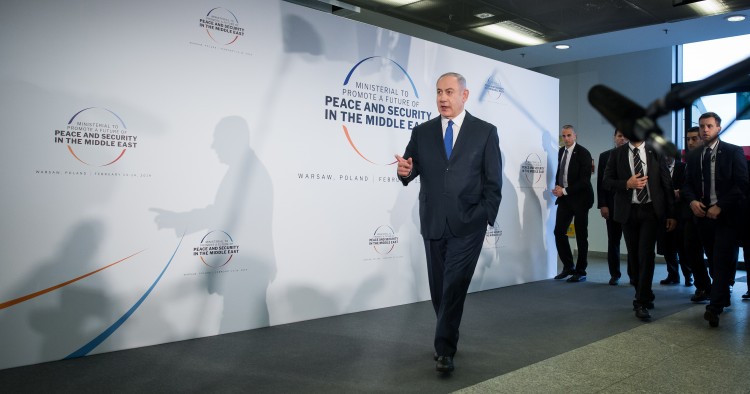This article was co-authored by Yoel Guzansky and Sigurd Neubauer, and was originally published on The National Interest.
Amid escalating tensions between the Trump administration and Tehran, Iranian foreign minister Javad Zarif declared at the annual Munich Security Conference that the “risk of war” between Iran and Israel was “great.” Zarif’s warning came only days after the Warsaw Summit, which sought to establish a broad-coalition to support President Donald Trump’s Middle East policies, including on Iran.
While the summit failed to marshal European support for Washington’s “maximum pressure campaign” against Tehran or to issue a joint communique on policy objectives, it provided the U.S. administration with a small but symbolic diplomatic victory: the Israeli prime minister, Benjamin Netanyahu, along with the foreign ministers from the Gulf Cooperation Council (GCC) countries—save Kuwait but Yemen—discussed Trump’s regional agenda, including his forthcoming peace plan designated for Israel and Palestine.
Even though Israel does not enjoy formal diplomatic relations with any of the six GCC monarchies—Bahrain, Kuwait, Oman, Saudi Arabia, Qatar and the United Arab Emirates (UAE)—Trump has succeeded where his predecessors have failed and established a public forum where Israeli and Arab officials can discuss regional issues. This forum makes possible for communication to continue even if sharp divisions within the GCC persist on a litany of issues ranging from the Qatar crisis to Yemen and Iran. This was the first meeting of its kind in over two decades.
Photo by Mateusz Wlodarczyk/NurPhoto via Getty Images
The Middle East Institute (MEI) is an independent, non-partisan, non-for-profit, educational organization. It does not engage in advocacy and its scholars’ opinions are their own. MEI welcomes financial donations, but retains sole editorial control over its work and its publications reflect only the authors’ views. For a listing of MEI donors, please click here.













